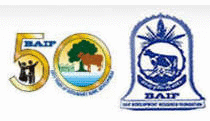Introduction-
Goat rearing is a better livelihood option for small, marginal and landless people of rural Rajasthan specially tribal. It’s like a ATM in rural economy for poor family but still goat keeper rearing their goats traditionally & far away from scientific approaches .
Major challenges for goat husbandry that it is completely un organized sectors that’s why attention of Govt. not up to the mark and emerging fodder issue is not under consideration which is a threat for good health of goat business and less study was done to understand present goat rearing and marketing system.
Overall overview of project -
In contrast to this im Goats will provide a model of goat rearing involving all actors of goat value chain through formation of Goat Producer Group ,establishing Innovative Platforms where all VCA will share all information for betterment of goat husbandry in local areas & increasing income of goat keepers.
Innovation platforms provide spaces for value chain actors to interact, communicate and act to improve performance of the value chain and the resulting benefits to the actors. The producer hubs are mechanisms through which collective marketing of goats and inputs of goods and services can be achieved in a cost effective manner. These mechanisms will be contribute to building capacity of value chain actors, with women playing key roles in this processes
Project Area – Project is to be implemented in 48 villages of Jhadol & Sarada blocks of Udaipur district covering 3000 goat keeper families spread over 25 Gram Panchayat.
Project implementation strategies and approaches –
in contrast to these issue it is planned that regular interaction among all value chain actors to mind set to adapt new practice in goat rearing and marketing.
Highlight of activities -
Focus Group Meeting in each village in which theme and motive of project was shared with goat keepers .
Entry Point Activity de worming camp for goats was organized in 31 villages and through these camps 9814 goats has been de wormed
Base line survey was started to get targeted Goat keepers family involving local youth as FG & total 2595 goat keeper family selected in 40 villages.
Goat keeper Group 235 group has been formed ,
Breed improvement for this distribution of sirohi Breeding Buck were planned & 131 bucks has been distributed.
Interaction with VCA at village and district level for formation of Innovation Plate form.
IP Meeting - The first meeting of the Innovation Platform was held at Ankur Hall at Jhadol on 2nd August 2011. The meeting was attended by 27 participants (Please see Annex 1 for list of participants). The participants included representatives of goatkeeper groups, local trader-cum-butchers from Jhadol and Udaipur, Veterinary Officer from Animal Husbandry department, local pharmacist who supplies drugs for animal health care and insurance company agent from Udaipur. A woman sarpanch from Lilavas village also participated in the meeting. Apart from these, a few field guides (trained local paravets, also called as bakri mitras) belonging to the respective clusters attended the meeting. They are expected to play a key role in disseminating the results from discussions at the platform meeting to all the groups in the villages.
Partners
The International Livestock Research Institute (ILRI) will be responsible for the overall project implementation and leading the research. BAIF Development Research Foundation in India and CARE International in Mozambique will lead the development aspects and local administration in their respective project sites. The project will be collaborate with national researchers and other local development partners.





